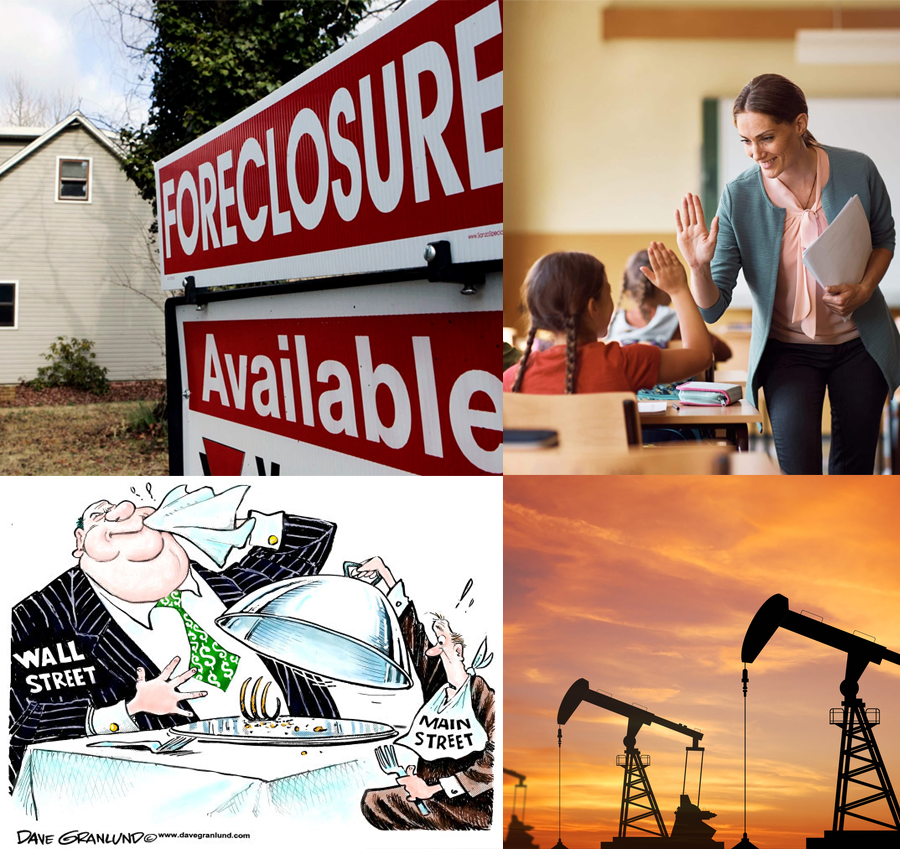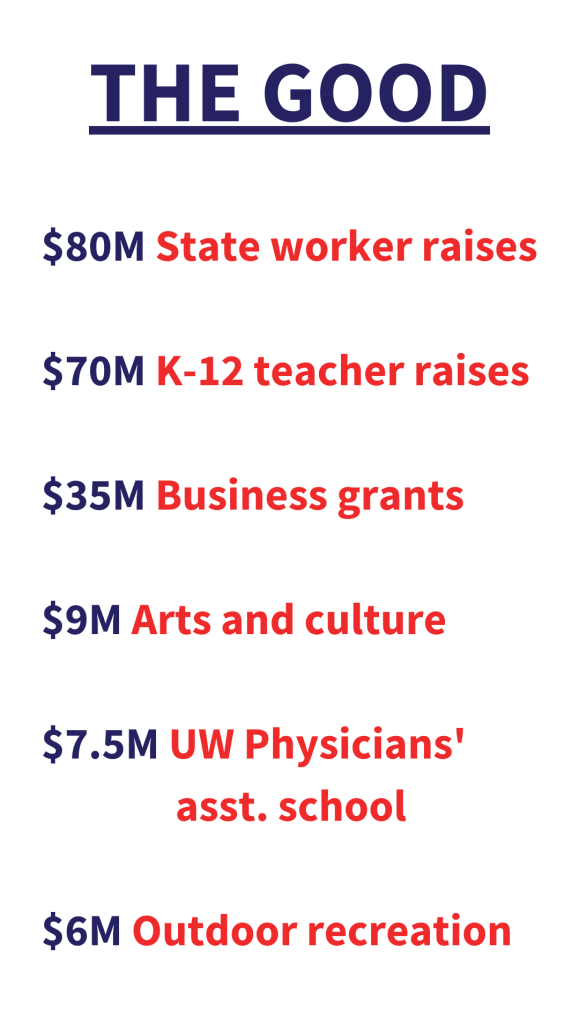 It's good to pay teachers and state employees what they're worth. But they need places to live, too.
It's good to pay teachers and state employees what they're worth. But they need places to live, too.Session recap: The good, the bad, and the ugly of Wyoming’s 2023 state budget
Wyoming lawmakers chose to sock away a record $1.4 billion into savings during the 2023 legislative session.
This makes sense, according to narrow logic: Whenever the bottom falls out of Wyoming’s boom-and-bust economy, money from savings accounts can help cover essential public services.
But Wyoming lawmakers also have the option to invest public money in local communities instead of sending it off to Wall Street, and to spend it in ways that create opportunity and help diversify the state’s economy.
This could help avoid such radical booms and busts in the future. But lawmakers rarely choose this second option.
During the 2023 session, the legislature did add $383 million to the state’s General Fund at a time when oil and gas revenues were booming.
Lawmakers have the option to spend public money in ways that create opportunity and help diversify the state’s economy. They rarely choose this option.
This is really nothing to write home about—in 2021, during a bust, the Legislature cut $430 million from the budget and eliminated 324 state jobs.
Much of this year’s spending did go to worthwhile projects—desperately needed cost-of-living raises for state employees and teachers, for instance, and investing in our outdoor recreation and arts industries.
And things could have been much worse: Had traditional Republicans not finally figured out how to stand up together against the so-called “Freedom Caucus,” the Legislature could have very well just put all of the state’s massive surplus in the bank.
Thankfully, the Freedom Caucus and their scorched-earth approach to public funding were soundly defeated in 2023, and the Legislature passed a frugal budget that spent in a few innovative ways but that largely reinforces the status quo.
The good: Raises, jobs, economy
Wyoming’s state agencies and public schools have been bleeding workers and talent for a decade as a result of stingy lawmakers pushing bogus claims about “big government.”
Meanwhile, the fossil fuel industries remain Wyoming’s only major source of jobs and revenue, in part because of lawmakers’ refusal to help develop other sectors.
In 2023, the Legislature approved cost-of-living pay increases for state employees and teachers—a worthwhile step in attempting to chip away at a problem years in the making.

This year’s 8 percent raise for state employees follows another of the same size passed in 2022—the total still does not bring state employee pay up to market value, but it’s getting close.
Prior to the two-step increase, Wyoming state workers earned nearly 20 percent less than market value.
Meanwhile, K-12 teachers struggled across Wyoming last year as the Legislature refused to grant school districts an “external cost adjustment” for cost-of-living raises, despite record-breaking inflation.
Their refusal to adequately fund schools prompted a lawsuit from the Wyoming Education Association and a coalition of local school districts.
Flush with cash and facing a tough day in court, the Legislature this year agreed to fund a $70 million “ECA” to increase teacher pay, which will help educators make ends meet and help school districts keep good employees.
The Legislature also directed some money toward economic development. They appropriated $35 million to the Wyoming Business Council for “Business Ready Community Grants” and public facilities grants that help local towns, counties, and tribes develop infrastructure to spur private development.
As Wyoming continues to face a shortage of healthcare workers, the Legislature approved $7.5 million to fund a physician’s assistant school at the University of Wyoming.
Lawmakers also created a $6 million trust fund to capitalize on outdoor recreation. It will help create and maintain mountain bike trails, shooting ranges, off-road routes, and campgrounds.
They also added $9 million to the Wyoming Cultural Trust Fund to enhance our creative economy.
The bad: Housing and suicide
Historically, Wyoming has spent essentially nothing to ensure its residents can live in and afford their homes.
Wyoming residents sometimes benefit from housing assistance programs, but these are almost always paid for by federal funds.
The state spends squat.
Rugged individualists might feel proud that Wyoming is one of just three U.S. states that has not established a housing trust to help ensure the cost of homes doesn’t outstrip what people earn.
But as housing crises intensify in communities across Wyoming—affecting middle-class families, low-income folks, and employers looking for workers—more and more residents recognize that something must be done.

or suicide prevention trust.
The Legislature did take a historic step in funding for housing in 2023, setting aside $5 million for grants to support workforce housing. This is the first time the state has ever used its own money for housing.
But the smallness of the effort only amplified its inadequacy. According to the Wyoming Chapter of the National Association of Housing and Redevelopment Officials, a housing trust fund in Wyoming would need a corpus of $500 million to generate enough money per year to support developers building workforce housing at a rate that keeps pace with moderate population growth.
The Legislature refused to even consider taking such a step this year, even though it felt fine sticking nearly three times that amount into savings.
Meanwhile, lawmakers did create a trust to help Wyoming deal with its crushing suicide epidemic, but they refused to fund it.
Governor Mark Gordon and veteran legislators like Rep. Steve Harshman (R-Casper) supported setting aside $46 million to permanently fund the state’s new “988” suicide prevention and crisis lines in perpetuity.
Despite having plenty of money, and despite the state’s clear need for help preventing suicide, lawmakers chose to leave the trust empty, sending their money instead to a Wall Street bank.
The ugly: Shoring up the crumbling status quo
The Legislature’s decision to stuff $1.4 billion into savings reflects lawmakers’ unwillingness to confront the basic issue that creates many of Wyoming’s problems: its mineral-dependent boom-and-bust economy.
Of course it seems to make sense to put money in savings if at any given moment tax revenues from the oil, gas, and coal industries could dramatically drop and the state still needs to keep the roads plowed and the schools open.
Since legislators are horrified by the political consequences of raising taxes, investment income can feel like a sweet way to fund the government.
That’s the reason Wyoming keeps a flush “Rainy Day Fund” (even though it never seems to really be rainy enough for legislators to spend it).
Lawmakers also put money into savings because it’s a way to generate revenue without raising taxes. Wyoming has more than $20 billion stuffed away in permanent trust funds, which provide interest payments to the state. These generated nearly $500 million during the 2021- 22 biennium.
Since legislators are horrified by the political consequences of raising taxes, this investment income can feel like a sweet way to fund the government (even though the returns are generally poor).
But as the world slowly turns away from Wyoming’s fossil fuel industries, it’s obvious we need to create some kind of new economic path forward.
During boom years, Wyoming could opt to use extra billions of dollars to create opportunities for new industries to develop and provide support for working families so they don’t have to move out of state.
And even though investment income allows lawmakers to dodge the political consequences of raising taxes, Wyoming will not be able to diversify its economy without diversifying its tax structure.
Legislators love to say that putting money into savings is “fiscally conservative,” but ignoring Wyoming’s structural economic and tax problems makes our state’s economy worse.
In 2023, lawmakers managed to direct some money toward some worthwhile causes, but they failed to do much of anything to confront underlying budget problems that face the state.





